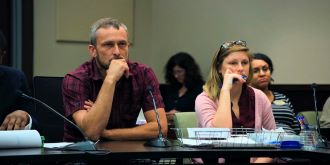
Courtroom 3H 2020
Distributed by Pragda, 302 Bedford Ave., #136, Brooklyn, NY 11249
Produced by 9am Media Lab and Aquí y Allí Films
Directed by Antonio Méndez Esparza
Streaming, 115 mins
College - General Adult
Adolescents; Child Abuse; Child Neglect; Children; Criminal Justice; Sociology
Date Entered: 07/12/2022
Reviewed by Giovanna Colosi, Librarian for the School of Education, Subject Instruction Lead, Syracuse UniversityCourtroom 3H gives viewers a glimpse of a family court courtroom in Tallahassee Florida in 2019. The presiding Judge, J Sjostrom, hears cases which focus on parental rights, juvenile delinquency, and other issues relating to minors. More than 300 cases were filmed.
Parents enter the court under allegations of abuse, neglect and/or abandonment. The judge tells families the courts priority is to try to put the family together, if it is safe to do so, as quickly as possible. The film is broken up into 2 parts, the first is “The Hearings.” Viewers can get a sense right away, of the desperation some of the families feel as their stories are being told. They at times plead with the judge to give them a second chance. We hear that the children, even in cases where abuse was involved, sometimes want nothing more than to be reunited with their parents. The trauma bond that the children have with the parents run deep.
Another thing that is highlighted is the intersectionality of poverty, drugs, and the lack of education. It is truly heart wrenching watching these families, some who you can clearly see love their children, struggle to provide for them the very basic of needs. On the flip side through you also see parents who are absent, who have true mental illness, or are too far gone into a hole of alcoholism and drug abuse to properly care, or even want to take care of their children.
In the second part of the film “The Trials” we see cases that couldn’t be resolved in the hearing stage go to the trial stage. Here you see parents who are still confused on why they are there, sometimes they exude a sense of entitlement on the stand, and often you can hear in their voices they want to be able to get their children back, but really lack the skills to do so.
Méndez Esparza shoots the film, so it seems you are a fly on the wall. At times this makes you feel immersed into the courtroom as you were there bearing witness. One negative is that the cuts are so quick from scene to scene, one is left wondering if we are looking at another new case and family or just a different camera angle. Those quick transitions pulled the viewer out of the moment if just briefly. The emotions exhibited are raw and powerful, even when the children's faces are obscured to provide anonymity, the viewer can feel the vast array of emotions. We see that at times what the children want isn't necessarily what is best, and that feels almost like a punch in the gut to both the children, families and the viewer.
This film would work well for in-class viewings in courses such as social work, sociology, counseling and human services and criminal justice.
Published and licensed under the Creative Commons Attribution 4.0 license. Anyone can use these reviews, so long as they comply with the terms of the license.